With just two weeks to go before the first round of the French presidential elections, growing anger over the uncertain fate of one of the last major steel-making plants in France has returned the issues of de-industrialization, globalization and the social responsibility of corporations to the fore of the political agenda.
Exhausted but triumphant, a group of 17 workers from the ArcelorMittal steel mill in Florange, in the Lorraine region close to the German border, finally reached central Paris on Friday amid public cheers and a battery of TV cameras after a ten-day, 330-kilometre march in protest at the feared imminent closure of part of their plant.

Enlargement : Illustration 1
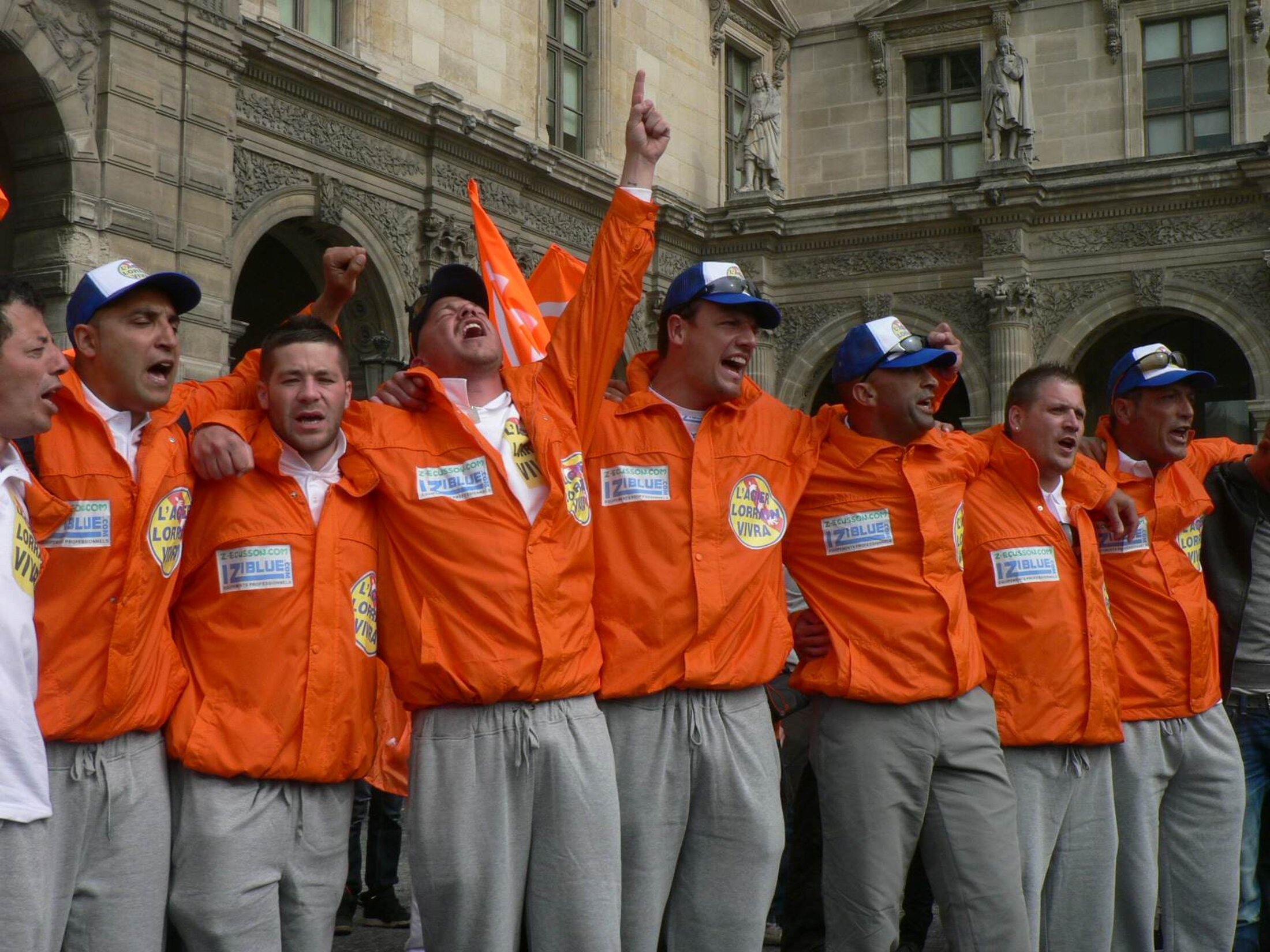
The site’s two blast furnaces, the last remaining in the Lorraine region, the historic heart of France’s steel-making industry, have been closed down since last October. ArcelorMittal, the world’s largest steel and mining company, says the halt is due to a slump in international market demand. However, the company has made no firm pledge to resume functioning of the furnaces, and union leaders warn that the shut-down is likely to become permanent, bringing with it the loss of 800 jobs.
The trade unions joint representative committee at Florange is demanding government intervention to keep the plant open, and in February warned that it would become “the government’s nightmare” until that happened.
Their forceful language follows the closure in March 2009 of another ArcelorMittal steelworks in Lorraine, despite President Sarkozy’s earlier firm and public commitment to keep the site, in the town of Grandrange, open. In 2008, the president was applauded by a crowd of workers at the troubled plant after he pledged to return in person with a solution to save their jobs. Union leaders later built a mock tomb at its entrance, with a dedication that read ‘here lie the promises of Nicolas Sarkozy’.
Luxembourg-based ArcelorMittal was created in 2006 after the hostile takeover by Mittal Steel, founded in India, of Arcelor, once the world’s second-largest steel producer. Arcelor was previously formed after a merger of French steel giant Usinor with Spain’s Aceralia and Luxembourg’s Arbed. The long pattern of mergers and takeovers - Usinor was the re-brand in 1997 of a merger between France’s two largest steel-producing companies – has logically followed the gradual decline of the once flourishing and abundant mills of north-east France, a former bastion of French industry.
The walk to Paris, which began from Florange on March 28th, has attracted widespread media coverage in France just weeks before polling begins in the first of the two-round presidential elections on April 22nd. “It’s not true that France is individualist, despite what we are told to believe,” said one of the marchers on Friday, recalling their encounters along the way. “France is a fantastic country.”
The images of the popular welcome the men have received along their route – one of them described the experience as “solidarity Made in France” - has further embarrassed Sarkozy after he recently entered into a public slanging match with union leaders from the Florange plant. That was sparked when riot police using CS gas dispersed an earlier protest on March 15th by some 200 ArcelorMittal workers from Florange who gathered outside the president’s re-election campaign headquarters in Paris.
Following that, Sarkozy gave an interview in early April to three regional dailies in Lorraine in which he fiercely criticized ArcelorMittal union leaders who he said “mislead their members by involving themselves in politics instead of defending the interests of employees”. He said union officials “came to insult me and tried to smash up my campaign headquarters” during the mid-March demonstration.
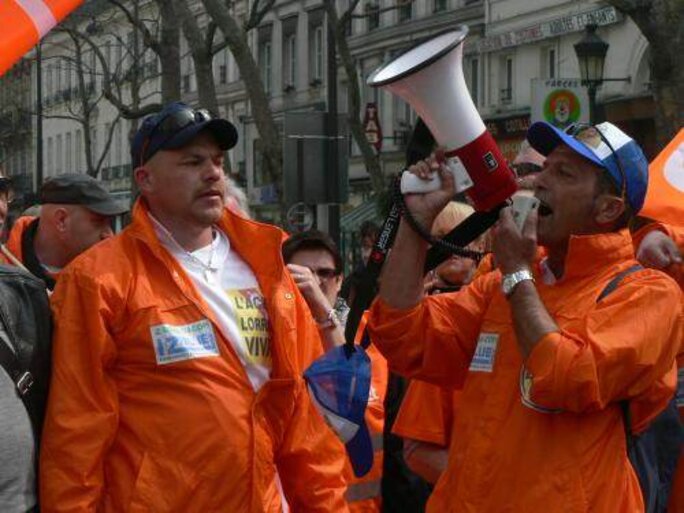
“Our march, it’s a message aimed at politicians, elected representatives of all political sides,” said Edouard Martin, CFDT union official at the Florange plant and a leader of the protest against the threatened closure, after the group arrived in Paris on Friday. “When you have the will, you can. We had a target, to reach Paris. We are tired, we’ve got blisters, but despite the difficulties, we’ve got here. So yes, we’re involved in politics. It’s the best answer one can give to our detractors, those who insulted us.”
Asked about their recollections of the journey, the steelworkers offered anecdotes like that of a champagne producer who turned up to greet them with bottles for a celebration, or the memory of an old man who offered a probably needy two euros for their collection tin. They were given accommodation by a number of town halls along the way, while three others refused them shelter, notably that of the town of Meaux, some 60 kilometres east of Paris, whose mayor and MP is Jean-François Copé, leader of Sarkozy’s ruling UMP party.

Enlargement : Illustration 4
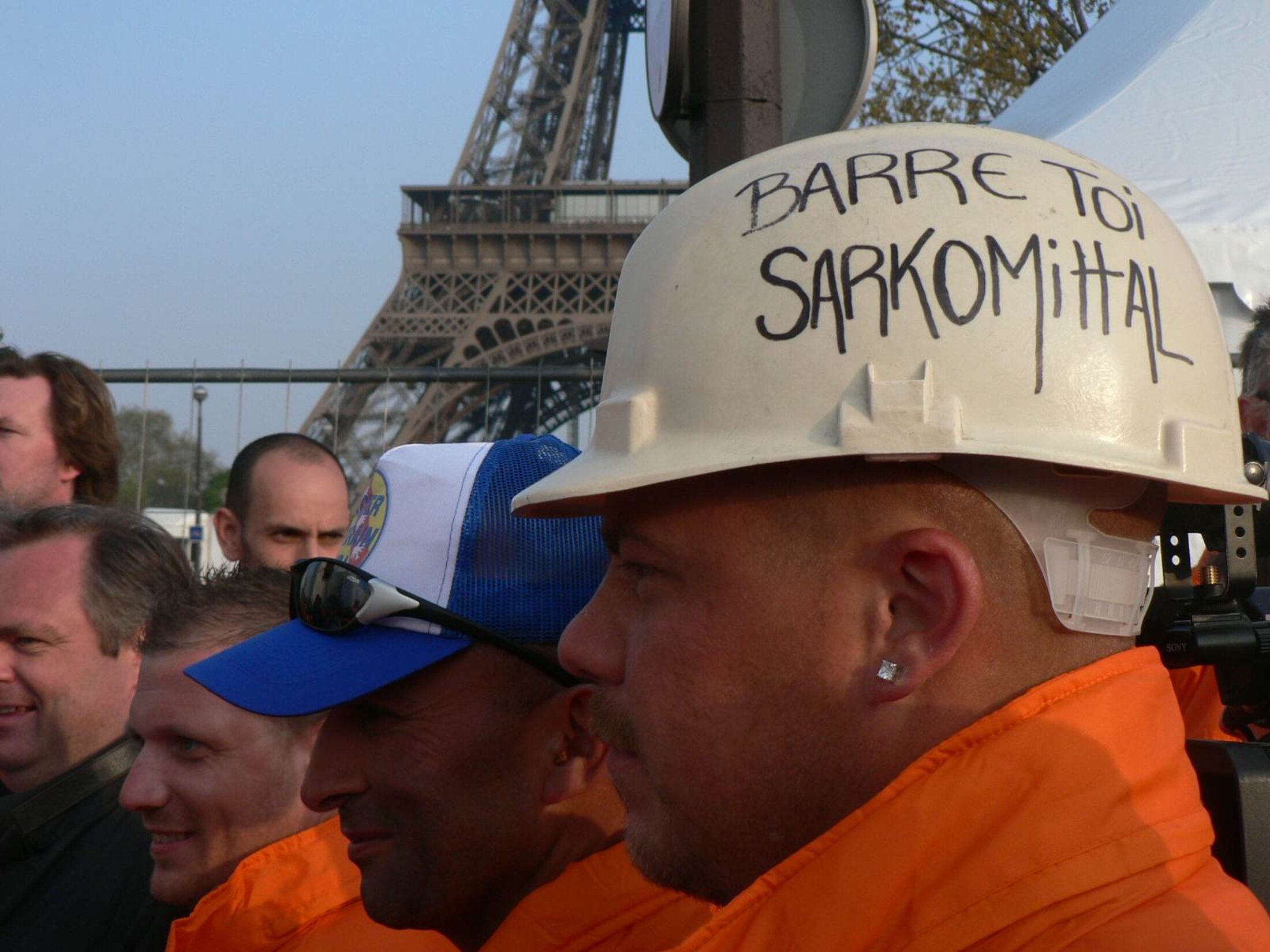
After arriving in Paris, the marchers’ first stop was the Place de la République, where they sang “We have arrived, we have arrived” to the tune of a traditional victory chant by French football fans when their team reaches a final (“On est en finale!”). The group, all dressed in grey sports trousers and orange tops, made up of all ages and, from appearances, not all sharing the same level of fitness, then crossed the capital arm-in-arm to reach the Eiffel Tower. Onlookers applauded even as they passed through wealthy neighbourhoods in a noisy cortege, complete with a loudspeaker booming out a determined promise of “we won’t give an inch”.
As they passed through the Saint-Germain des Près district of the Latin Quarter, a woman appeared at the first floor of the Paris-Descartes university building blowing them kisses and crying out “bravo”. The marchers chanted “Thank you, madam” in return.
'Mittal can throw us out to make even more money'
At the Place du Trocadero, close to the Eiffel Tower, they were joined by their families and colleagues who had made the journey by coach, and a reception committee of politicians including Socialist Party presidential candidate François Hollande’s communications chief, Manuel Valls, radical-left candidate Jean-Luc Mélenchon, and Anne Hidalgo, deputy to Paris mayor Bertrand Delanoë. The Eiffel Tower was a symbolic choice of venue for the end of their march, “built in steel from the Lorraine” as a speaker at the gathering underlined.
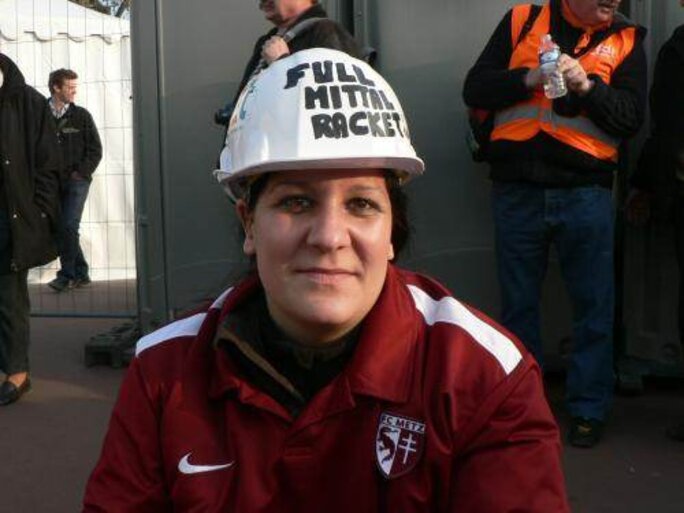
One of the marcher’s wives, who did not want to be named, dismissed Mélenchon’s presence. “He turns up with his nice clean suit, but it’s not him who walked,” she said. Laurence Baumann, who had come to Paris to cheer on her godson, one of the marchers, also denounced the presence of the politicians who she said “wanted to have their part of the cake”. She spoke of her pride at her godson who had completed the walk while travelling backwards and forwards to complete his shifts at Florange. “He has a lot of merit, I hope it’ll serve for something,” she said.
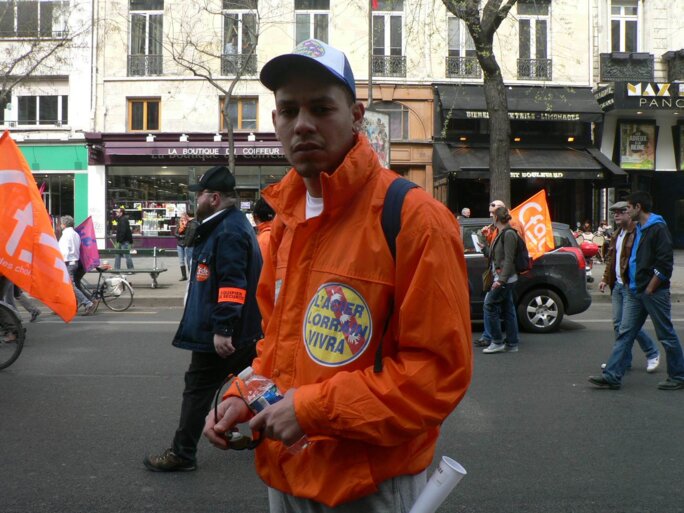
Enlargement : Illustration 6

Among the marchers was 29 year-old father-of-three Philippe Vassali, who joined the group for the last seven days of the trek. He works in the coke plant at Florange which, although not threatened with closure, is currently functioning at 90% of capacity entailing cut-backs in working hours. “It’s indescribable,” he said of the days on the march, “a magic human experience, but also a strong and pacific event.” He said he “fell on my backside” when he heard of Sarkozy’s attack on the plant’s union leaders in the regional press. “The 17 who marched are also true workers,” he said. “We hope the outgoing president makes an important effort to give us back full-time employment.”
Another of the marchers, José Delgado, 54, said the experience had left him “as proud as anything” although he expressed regret that more workers hadn’t joined them.
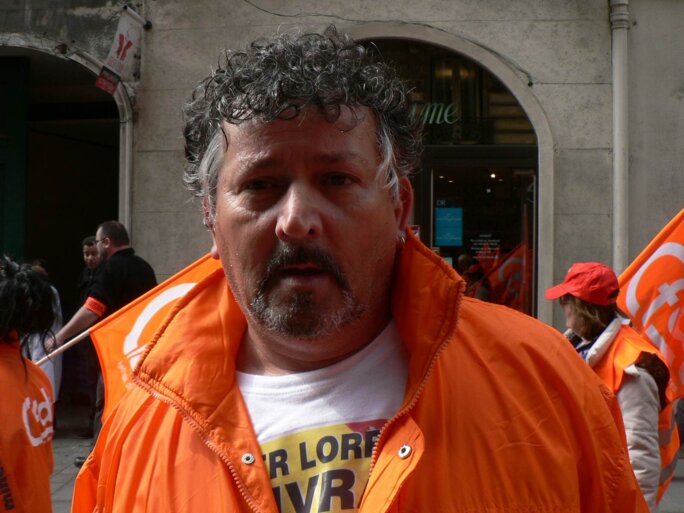
Enlargement : Illustration 7

He said he was angry since hearing Sarkozy’s attack on the unions. “We’re not hoodlums like he’s made out,” he said. “I’m 54 years-old, I’m not a hoodlum. I was at the [demonstration outside Sarkozy’s] HQ. I was gassed. I felt hate. The president talks to us about ‘working more to earn more’. I’m a worker. I do 16-hour days. There’s nothing left in the valley, everything’s dying. On the road, if you knew how much people are unhappy, it’s incredible.”
An evening concert was organized close to the Trocadero square, where veteran French chart-topping group Zebda and singer Bernard Lavilliers performed, along with the comic - and Mediapart contributor - Didier Porte.
The event drew a crowd of only some several thousands, far fewer than the 40,000 spectators the unions had said they hoped would turn up, but the angry tempo continued. The Florange plant’s CFDT union leader, Edouard Martin, launched into an attack on ArcelorMittal chairman and CEO Lakshmi Mittal. He described Mittal, 61, whose personal fortune is estimated as the sixth-largest worldwide, as “this billionaire who can throw us all out because he wants even more money”. Another worker from Florange called out to the crowd: “We’re going to elect politicians. They must do their job now, save jobs and create others.”
“Nicolas Sarkozy has made a real mistake,” commented Alain Gatti, an official with the CFDT union branch in Lorraine who joined the marchers in Paris. “The lads don’t represent only themselves. The CFDT-CGT-FO trade unions representative committee represents 75% of employees. I wish the same score for all the presidents of France.”
-------------------------
English version: Graham Tearse


